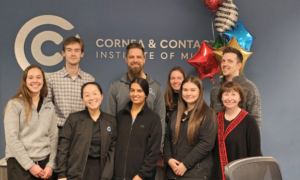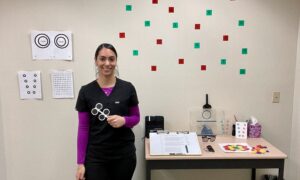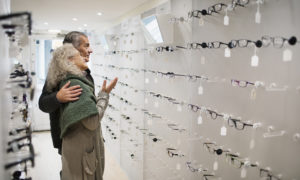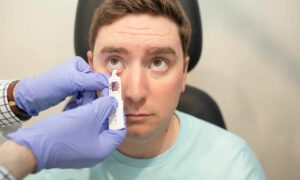By Diane Palombi, OD

Oct. 24, 2018
Solo, independent practice offers many rewards, including the freedom to be your own boss, with no need to consult partners. I experienced my own positive experience with solo, independent practice for over a decade prior to retiring seven years ago.
The great potential of this mode of practice seems in danger of being lost. I was concerned, so I reached out to a couple ODs with solo practices to see if they also are concerned, and what they think the profession could do to make solo, independent practice a viable option for more doctors.
One is Matt Kirks, OD, of Kirks Eye Center, in St. Louis, who opened his solo practice cold around the same time that I did in the early 2000s. He now has
Other Articles to Explore
another optometrist in his employment. The second is an optometrist, whom I refer to as “Dr. M,” because she wishes to remain anonymous. Dr. M also is a solo practitioner, but opened her practice within the last five years.
Will the Solo, Private Practitioner Be Phased Out?
Dr. Palombi: “Will private, solo doctors be phased out in the future as they seem to have been mostly phased out in other medical fields? It seems that all you see in medicine today are group practices or hospital-owned practices.”
Dr. M.: “I think the forces are strongly favoring this direction except for doctors who have unique skills, practice in an unsaturated area for those skills, have a supportive home environment and have a financial plan for doing so [starting a solo, independent practice] before starting optometry school.”
Dr. Kirks: “There will always be those independent physicians who do not want to be tied a corporation or be told what to do. Those who value their independence will always seek out avenues of self-determination. As for hospital-owned practices, this will be an option for some, but hospitals are interesting to observe. I have seen private physicians welcomed by hospitals to fill their new “medical building,” then get turned out so the hospital can convert the space to bed more in-patients. This has played out multiple times at the local hospital down the street from my office, and I am sure it happens in much the same way across the country. Having said this, hospitals will continue to work in their own best interest, and if that includes ophthalmology and optometry, then they will continue to employ OMDs and ODs until it makes more sense for them to convert the space for in-patient beds.”
What Are the Top Challenges of the Solo, Independent OD?
Dr. M.: “I am constantly trying to get everyone to play by the rules they are well aware of: employees by their job description, third parties by their contracts, vendors by their order fulfillment and patients following instructions.”
Dr. Kirks: “It is amazing that even though there are multiple pressure points on a solo practice, the allure is still there. There are challenges from literally every angle, from marketing to bringing patients into the office, to dealing with insurance companies, to government regulations, to employee/payroll/401K, facility operations, equipment, IT/networking, the list goes on. There is not a day which passes that I am not handling something to do with the office. At the same time, it is worth it to know that I am taking care of my patients in a personal manner and a more comprehensive way, as I see fit.”
Is it Harder for Today’s New Grads to Start or Buy a New Solo Practice?
Dr. M.: “If they bear the average cost of education, definitely yes [harder] to a cold start and maybe yes [harder] to an existing practice, depending on the buy-in agreement. If the cost is offset by parental or spousal contributions, then no [not harder].”
Dr. Kirks: “There are two distinct barriers today which were present when I started in practice 20 years ago, but are greater today. One is cost of equipment to start an office. This is where I will begin to sound old! When I started I had a business plan which included equipment and inventory for opening cold. Today, that cost is much higher mainly due to computer systems and IT/networking. I was able to purchase filing cabinets and paper files relatively inexpensively. Today the cost of computers and establishing a network in the office, as well as maintaining the network and purchasing an EHR to comply with regulations, is much higher for a start-up.
The second is the amount of debt the students have coming out of school. It is equivalent to a small house payment right out of the gates. The sad thing is that they feel they need to make a million dollars to get out of debt, and end up working for a chain that offers more initial money upfront, then replaces them when they don’t hit the margins. This is an untenable situation.”
Have Government Mandates (EHRs, HIPAA, new Medicare codes) Made Solo, Independent Practice Harder?
Dr. M.: “As a smaller, newer practice that opened using an EHR, as well as one that has more young patients than old, no, as the incentives came at the perfect time. However, I see a need in the near future for a scribe to provide better clinical care.”
Dr. Kirks: “Let me start by saying sometimes they seem to come up with new challenges just to see if we will jump through the hoops! HIPPA, EHR, Medicare rules and regulations, all increase the risk and cost of doing business. In the internet world today, it is virtually impossible to guarantee security, but we are tasked with doing just that – I need only point out the example of Equifax as one of many breeches in security. The burden is impossible at times, but we must simply do our best with what we have to work with.”
Will You Retire Early or Change Your Mode of Practice Due to the Challenges of Solo, Independent Practice?
Dr. M.: “Retiring early was one of the reasons to start private practice so I hope so, LOL! I have always liked variety, so I can see expanding my career within different areas of optometry, but it would take a lot to leave private practice. The control over my schedule, and the respect given by patients, greatly offsets the administrative headaches.”
Dr. Kirks: “There is no pension or large corporation which would allow me to retire comfortably and have the next wave of workers pay my way. That is why it is ultimately up to the individual to save for their own future. I have made it my cause to be debt-free (as much as I possibly can). Fortunately, I started, and continued, on sound footing by paying off my college loans, paying off my start-up expenses, paying off equipment purchases, and saving all along the way via a Simple IRA initially, and then a 401K. Keeping debt to a minimum and saving for your own retirement is the best approach to securing your own future.”
Is Optometry Based on Glasses and Contact Lenses Being Replaced By Specialized, Medical Eyecare-Based Optometry?
Dr. M.: “Corporate optometry will remain more traditional. Private practice will become modified, but not replaced, as technology simultaneously pushes traditional optometry out while expanding specialty care, some of which includes glasses and contacts. Reduced insurance reimbursement is forcing some specialties within optometry to keep private-pay services.”
Dr. Kirks: “Refraction is unique in our specialty, and obviously we must maintain our skills and rights there. Specialties which allow for a combined care team make a lot of sense, as this is another means to create a wide base of care for a larger part of the family. The more narrow the specialty the larger the referral source needs to be. The medical model has worked for me since the start of my practice. I see this as “diversification.” I feel it makes my services more rounded out and I can maintain continuity of care better when I can examine and treat different eye diseases. It does require investment in equipment and coding/billing resources, but when you can take care of the entire family from youngsters to the elderly, you have cast a much wider net in your services and the patient is better cared for in one location rather than running here or there for uncoordinated care, as well as the potential loss of the patient and their family.”
It was interesting getting Dr. Kirks and Dr. M’s perspectives on the future of independent, solo practice. Personally, I am not certain what the future will hold for solo private practice optometry. Student debt is an obstacle. Start-up costs are much greater now than when I started up almost two decades ago.
I did not even own a computer initially, bought a used lane, performed visual fields with a tangent screen and had consignment frames on my frame board. EHR was one of the reasons I decided to retire early because I felt that based on the size of my practice, I would be unable to recoup the cost of the investment. A look through the local phone book is showing an increase in group optometric practices and a decline in solo practices. Most of the solo doctors listed have been in practice for decades.
As solo practitioners leave optometry, it seems that they are not being replaced by young optometrists. The next generation of optometrists are searching for other modes to practice optometry.
Are you a solo, independent OD? If so, why did you decide on this mode of practice, and what is your projection for the future? Is solo, independent optometry still a viable and thriving way to practice optometry?
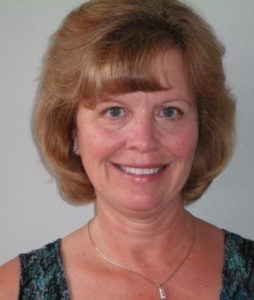 Diane Palombi, OD, retired now, is the former owner of Palombi Vision Center in Wentzville, Mo. To contact her: dlpod1@hotmail.com
Diane Palombi, OD, retired now, is the former owner of Palombi Vision Center in Wentzville, Mo. To contact her: dlpod1@hotmail.com



